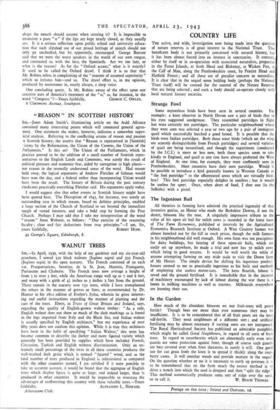" REASON " IN SCOTTISH HISTORY
SIR,—Janet Adam Smith's illuminating article on the Auld Alliance contained many interesting points which will command general agree-
ment. One statement she makes, however, indicates a somewhat super- ficial analysis. Referring to the conflicting strains of reason and passion n Scottish history, she asserts that "Reason is represented in [Scottish] istory by the Reformation, the Union of the Crowns, the Union of the ?arliaments." Is this so? The Union of the Parliaments, which in practice proved to be the addition of a small number of Scottish repre- sentatives to the English Lords and Commons, was surely the result of political pressure and economic fear, aided by corruption in high places— not reason in the normally understood sense of the word. Had reason held sway, the logical arguments of Andrew Fletcher of Saltoun would have won the day, and a federal rather than incorporating Union would have been the result. The history of Britain during the past century vindicates practically everything Fletcher said. His arguments apply today.
I would suggest also that other events in Scottish history might have been quoted here. The Disruption of 1843, for instance, was surely an outstanding case in which reason, based on definite principles, enabled a large section of the Church of Scotland to see beyond the immediate tangle of vested interests, and take a bold step by forming the Free Church. Perhaps I may add that I take my interpretation of the word " reason " from Webster, as follows: " Due exercise of the reasoning faculty ; clear and fair deductions from true principles."—I am, Sir,
yours faithfully, ROBERT HURD. 49 George's Square, Edinburgh, 8.


























 Previous page
Previous page